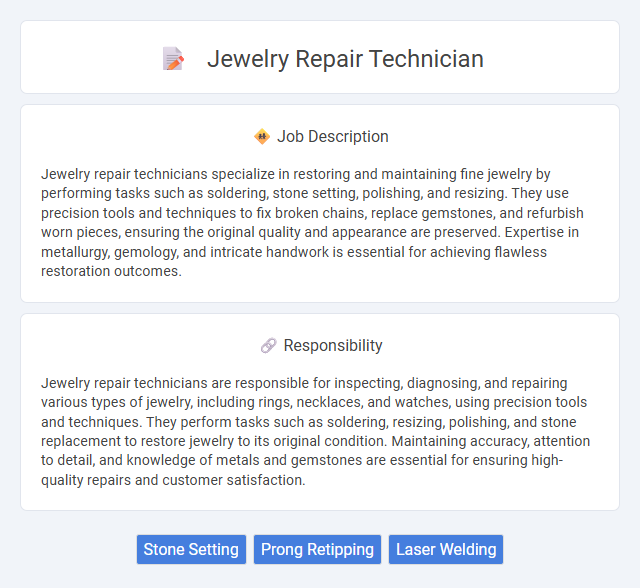
Jewelry repair technicians specialize in restoring and maintaining fine jewelry by performing tasks such as soldering, stone setting, polishing, and resizing. They use precision tools and techniques to fix broken chains, replace gemstones, and refurbish worn pieces, ensuring the original quality and appearance are preserved. Expertise in metallurgy, gemology, and intricate handwork is essential for achieving flawless restoration outcomes.
People with strong attention to detail and manual dexterity are likely suitable for a jewelry repair technician role, as it requires precision work. Those who enjoy working with their hands and solving intricate problems may find this job fulfilling. However, individuals who prefer fast-paced environments or dislike repetitive tasks might be less suited for this profession.
Qualification
A jewelry repair technician must possess extensive knowledge of metals, gemstones, and intricate repair techniques, often acquired through specialized training programs or apprenticeships. Proficiency in operating precision tools such as soldering equipment, microscopes, and polishing machines is essential for restoring intricate jewelry pieces. Certification from recognized institutions like the Gemological Institute of America (GIA) or industry-specific credentials enhances employability and validates expertise in jewelry repair.
Responsibility
Jewelry repair technicians are responsible for inspecting, diagnosing, and repairing various types of jewelry, including rings, necklaces, and watches, using precision tools and techniques. They perform tasks such as soldering, resizing, polishing, and stone replacement to restore jewelry to its original condition. Maintaining accuracy, attention to detail, and knowledge of metals and gemstones are essential for ensuring high-quality repairs and customer satisfaction.
Benefit
Jewelry repair technicians likely experience benefits such as developing specialized skills in metalwork, stone setting, and engraving, enhancing their craftsmanship and marketability. They probably gain job satisfaction from restoring valuable or sentimental pieces, which can create a meaningful work environment. The role may also offer steady employment opportunities in retail, repair shops, or custom jewelers, contributing to financial stability.
Challenge
Jewelry repair technicians likely face intricate challenges requiring meticulous attention to detail and steady hands due to the small, delicate components involved. The probability of encountering diverse repair types means continuous skill adaptation and problem-solving are essential. High precision demands and the necessity to meet client expectations may often create a consistently challenging work environment.
Career Advancement
Jewelry repair technicians enhance their career prospects by mastering skills in metalworking, stone setting, and precision soldering, which are essential for complex restoration projects. Gaining certifications from recognized bodies like the Gemological Institute of America (GIA) or the Jewelers of America (JA) can significantly improve job opportunities and salary potential. Experienced technicians often advance to senior roles such as master jeweler, quality control supervisor, or open their own repair businesses, leveraging expertise and industry reputation.
Key Terms
Stone Setting
Jewelry repair technicians specializing in stone setting expertly secure precious gems into various metal settings using techniques such as prong, bezel, and channel setting to ensure durability and aesthetic appeal. They assess stones for size, shape, and type to select appropriate tools and methods, maintaining the integrity of both the jewelry piece and the gem. Precision, attention to detail, and knowledge of various gemstones are essential skills for restoring and enhancing fine jewelry through meticulous stone placement and stabilization.
Prong Retipping
Prong retipping is a critical skill for jewelry repair technicians, ensuring the secure setting of gemstones by restoring worn or damaged prongs. This precise process involves reshaping and soldering metal to reinforce prongs, preventing stones from becoming loose or lost. Expertise in prong retipping enhances the durability and aesthetic quality of fine jewelry, making it essential for maintaining valuable pieces.
Laser Welding
Laser welding is an advanced technique used by jewelry repair technicians to precisely fuse metal components without damaging delicate gemstones or intricate details. This process enables seamless restoration of broken or worn jewelry pieces by providing strong, clean welds that preserve the original design and durability. Mastery of laser welding technology is essential for efficient, high-quality repairs in modern jewelry craftsmanship.
 kuljobs.com
kuljobs.com